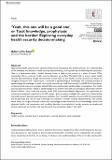Files in this item
‘Yeah, this one will be a good one’, or tacit knowledge, prophylaxis and the border : exploring everyday health security decisionmaking
Item metadata
| dc.contributor.author | Ferhani, Adam James | |
| dc.date.accessioned | 2023-01-11T17:30:11Z | |
| dc.date.available | 2023-01-11T17:30:11Z | |
| dc.date.issued | 2022-12-06 | |
| dc.identifier | 282892182 | |
| dc.identifier | 563c9f1d-8f9f-40b1-92b7-2337fbb5feaf | |
| dc.identifier | 85125584671 | |
| dc.identifier.citation | Ferhani , A J 2022 , ' ‘Yeah, this one will be a good one’, or tacit knowledge, prophylaxis and the border : exploring everyday health security decisionmaking ' , Security Dialogue , vol. 53 , no. 6 , pp. 497-514 . https://doi.org/10.1177/09670106211066750 | en |
| dc.identifier.issn | 0967-0106 | |
| dc.identifier.uri | https://hdl.handle.net/10023/26740 | |
| dc.description | Funding from the Economic and Social Research Council (ESRC) under Grant no. ES/J500215/1 is gratefully acknowledged. | en |
| dc.description.abstract | Approaching health security from a practice-theoretical perspective, this article advances our understanding of the everyday and locality in health security decisionmaking, and is guided by the following two questions: How is it determined when a health security threat is likely to be present at a point of entry? What knowledge informs everyday health security decisions at borders? Markedly little is known about health security decisionmaking, though conventional wisdom tells us that health security decisions are based on stringent processes and – importantly – anchored in epidemiological knowledge. The assumed primacy of epidemiological knowledge in health security decisionmaking is well illustrated by the SARS-CoV-2 pandemic: evidence-based responses emerged globally following sophisticated epidemiologic investigation. Are health security decisions always rooted in epidemiology? A 12-month period of non-participant observation of Port Health Officers – who, under the auspices of the 2005 International Health Regulations, are responsible for numerous prophylactic measures at the UK border – gives a unique, privileged entry point for understanding the health security decisionmaking process and tells a story that both questions the centrality of epidemiology and foregrounds the role of tacit knowledge and intuition in health security decisionmaking. This article, which draws on insights from the science and technology studies literature on tacit knowledge, shows how observed health risk taxonomies and corollary decisions in prophylactic border security are predicated almost exclusively on hunches and ‘just knowing’ that something ‘doesn’t feel right’. | |
| dc.format.extent | 18 | |
| dc.format.extent | 532896 | |
| dc.language.iso | eng | |
| dc.relation.ispartof | Security Dialogue | en |
| dc.subject | Health security | en |
| dc.subject | Practice theory | en |
| dc.subject | Praxiography | en |
| dc.subject | Security decisions | en |
| dc.subject | Tacit knowledge | en |
| dc.subject | JN101 Great Britain | en |
| dc.subject | JZ International relations | en |
| dc.subject | T-NDAS | en |
| dc.subject | SDG 3 - Good Health and Well-being | en |
| dc.subject | MCC | en |
| dc.subject.lcc | JN101 | en |
| dc.subject.lcc | JZ | en |
| dc.title | ‘Yeah, this one will be a good one’, or tacit knowledge, prophylaxis and the border : exploring everyday health security decisionmaking | en |
| dc.type | Journal article | en |
| dc.contributor.institution | University of St Andrews. School of International Relations | en |
| dc.identifier.doi | https://doi.org/10.1177/09670106211066750 | |
| dc.description.status | Peer reviewed | en |
| dc.identifier.url | https://eprints.whiterose.ac.uk/180280/ | en |
This item appears in the following Collection(s)
Items in the St Andrews Research Repository are protected by copyright, with all rights reserved, unless otherwise indicated.

